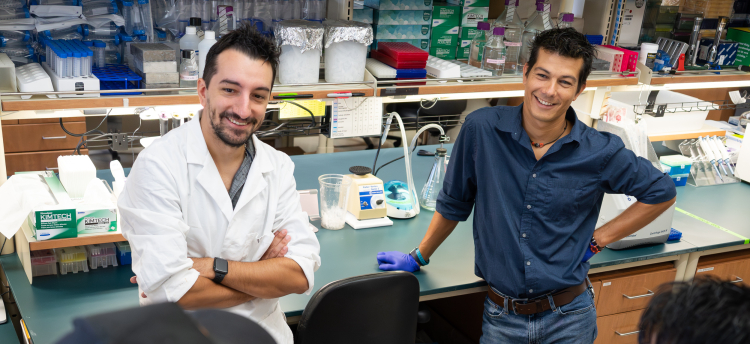UW–Madison postdoc receives Pew Latin American Fellowship to continue research in cancer wasting syndrome

The Pew Charitable Trusts has named Matías Fabregat, MSc, PhD, a postdoctoral fellow with the University of Wisconsin Department of Medicine’s Division of Diabetes, Endocrinology and Metabolism, as a member of its 2023 class of Pew Latin American Fellows in the Biomedical Sciences.
Dr. Fabregat, a native of Uruguay with graduate degrees in cellular biology, joins nine other postdoctoral fellows from Latin American countries who will receive two years of funding from Pew.
The funding will allow Dr. Fabregat to continue his research on how cancer cells induce cachexia, a metabolic disorder marked by extreme weight loss, specifically of fat and muscle tissue.
“In their weakened state, cancer patients suffering from cachexia can struggle to respond to chemotherapy and other crucial treatments,” explains Dr. Fabregat. “Having better methods of predicting and managing its onset could directly improve patient outcomes.”
Current therapies for the disorder are mostly palliative and focus on combatting anorexia through appetite stimulation. In contrast, Dr. Fabregat’s research traces the metabolic processes that occur at a cellular level before and during the onset of cancer cachexia—and has identified signaling molecules that contribute to fat tissue loss.
“Matías’s cell-based model of investigation holds immense potential for the discovery of new biomarkers and therapeutic targets for the early detection and treatment of cancer cachexia,” says Dr. Fabregat’s mentor, Andrea Galmozzi, PhD, an assistant professor also in the Division of Diabetes, Endocrinology and Metabolism. “What’s more, it has had promising preliminary validation among cancer patients.”
Dr. Fabregat and the other fellows may choose to return to Latin America to launch their own research labs with additional funding from Pew. About 70 percent of past fellows have pursued this option, contributing to a more robust biomedical research community in Latin America.
“Scientific exchange across countries and backgrounds is critical to making groundbreaking discoveries,” says Susan K. Urahn, Pew’s president and CEO, in a recent press release. “That’s why Pew is pleased to support such an impressive cohort from Latin America who will continue this legacy of advancing global biomedical science.”
“It’s a huge honor,” says Dr. Fabregat. “I’m so grateful to be one of the 10 people selected for the fellowship, and so grateful that I’ve been able to get to this point in my research thanks to the support of so many people at UW–Madison.”
Banner: Matías Fabregat, MSc, PhD, (left), in the lab with his mentor, Andrea Galmozzi, PhD (right). Credit: Clint Thayer/Department of Medicine.